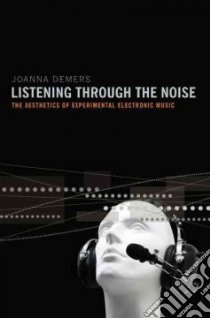- Libreria
- >
- Libri in lingua
- >
- Filosofia
- >
- Filosofia
Listening Through the Noise - 9780195387667
Un libro in lingua di Joanna Demers edito da Oxford University Press, 2010
- € 37.20
- Il prezzo è variabile in funzione del cambio della valuta d’origine
Electronic music since 1980 has splintered into a dizzying assortment of genres and subgenres, communities and subcultures. Given the ideological differences among academic, popular, and avant-garde electronic musicians, is it possible to derive an aesthetic theory that accounts for this variety? This book explores genres ranging from techno to electroacoustic music, from glitch to ambient music, and from dub to drones, and maintains that culturally and historically informed aesthetic theory is not only possible but indispensable for understanding electronic music.
The abilities of electronic music to use preexisting sounds and to create new sounds are widely known. This book proceeds from this starting point to consider how electronic music changes the way we listen not only to music, but to sound itself. The use of previously undesirable materials like noise, field recordings, and extremely quiet sounds has contributed to electronic music's destruction of the "musical frame," the conventions that used to set apart music from the outside world. In the void created by the disappearance of the musical frame, different philosophies for listening have emerged. Some electronic music genres insist upon the inscrutability and abstraction of sound. Others maintain that sound functions as a sign pointing to concepts or places beyond the work. But all share an approach toward listening that departs fundamentally from the expectations that have governed music listening in the West for the previous five centuries.
"A well-written, detailed, and thought-provoking reflection on the nature of a wide variety of contemporary electronic experimental works/genres and the theories of perception and listening that connect them." Richard Chartier, Sound Artist
"Lucid and surprising, Listening through the Noise deftly traverses the eclectic world of experimental electronic music. Demers engages central problems in the aesthetics of electronic sound: To refer or not to refer? To mean or be? To situate or dislocate? It will change the way you listen." Brian Kane, Yale University
Informazioni bibliografiche
- Titolo del Libro in lingua: Listening Through the Noise
- Sottotitolo: The Aesthetics of Experimental Electronic Music
- Lingua: English
- Autore: Joanna Demers
- Editore: Oxford University Press
- Collana: Oxford Univ Pr (Paperback)
- Data di Pubblicazione: 30 Luglio '10
- Genere: MUSIC
- Argomenti : Electronic music History and criticism Avant-garde (Music Music Philosophy and aesthetics
- Pagine: 201
- ISBN-10: 019538766X
- EAN-13: 9780195387667


